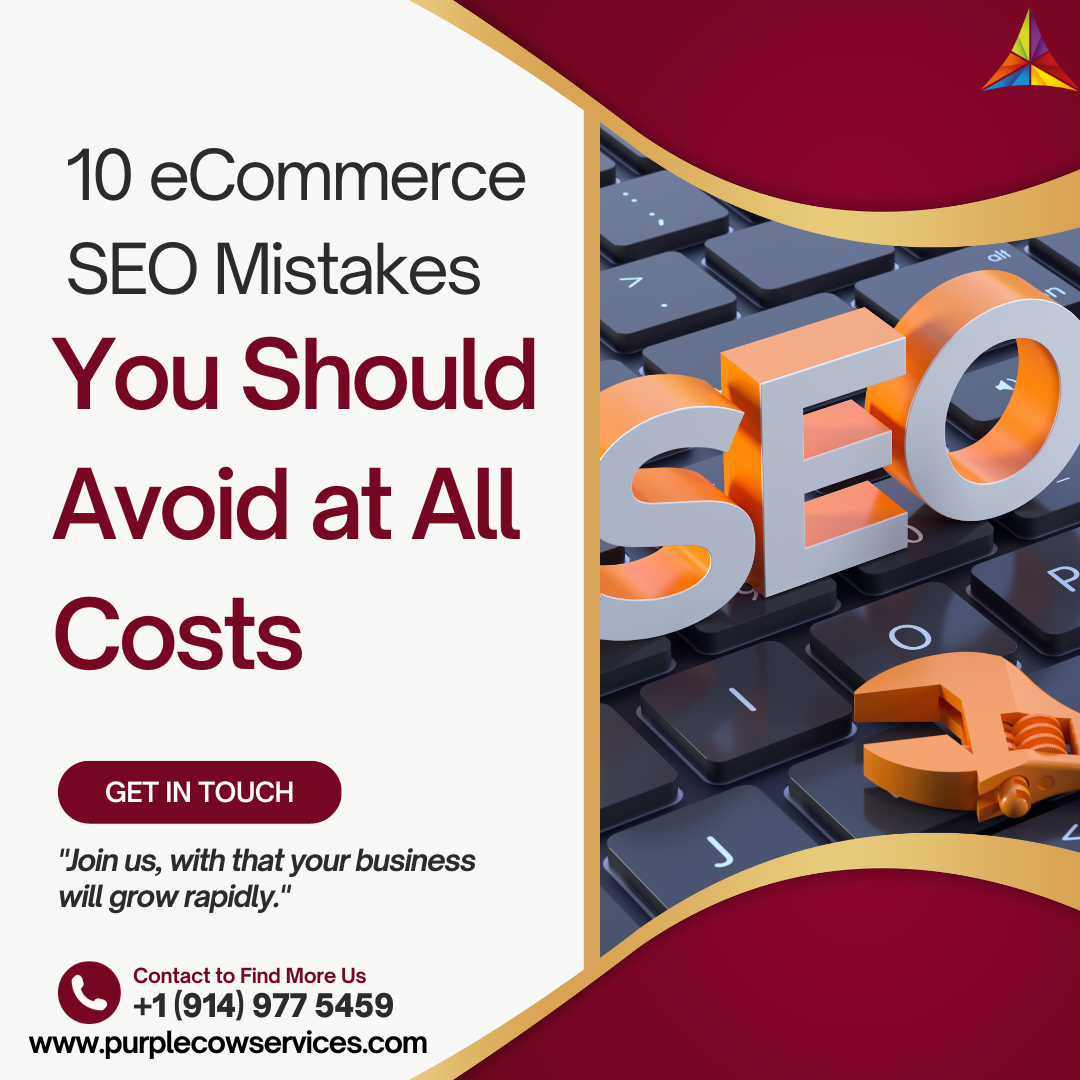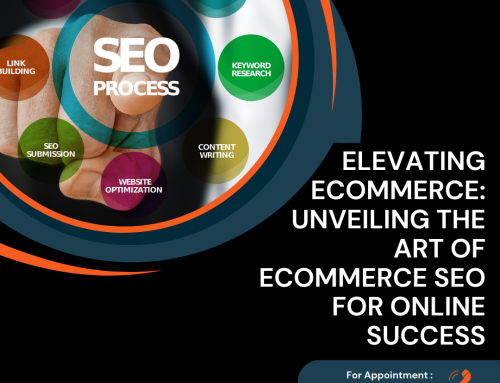In the ever-evolving landscape of eCommerce, one thing remains constant: the importance of SEO. Search Engine Optimization is the backbone of your online store's visibility and success.
Share This Story, Choose Your Platform!
When done right, it can catapult your eCommerce business to new heights, but when done wrong, it can leave you lost in the digital abyss. In this blog post, we’ll explore seven eCommerce SEO mistakes that you should steer clear of at all costs. From keyword blunders to neglecting mobile optimization, we’ve got you covered. So, let’s dive in and make sure your online store ranks high, converts customers, and thrives in the competitive eCommerce world.
Neglecting Mobile Optimization
In the mobile-first era, neglecting mobile optimization is a cardinal sin in eCommerce SEO. With the majority of online shoppers using smartphones, search engines prioritize mobile-friendly websites. If your site isn’t responsive or loads slowly on mobile devices, you’re pushing potential customers into the arms of your competitors.
One common mistake is not optimizing images for mobile. Large, high-resolution images may look fantastic on a desktop, but they can slow down your mobile site significantly. Use responsive design and compress images to ensure a seamless shopping experience on all devices. Investing in a mobile-friendly website not only boosts SEO but also enhances user satisfaction, which can lead to higher conversion rates.
Ignoring Long-Tail Keywords
Many eCommerce entrepreneurs make the mistake of fixating on high-volume, short-tail keywords like “shoes” or “electronics.” While these keywords may generate traffic, they often face fierce competition, making it challenging for your store to rank. Instead, consider the power of long-tail keywords, which are longer and more specific phrases like “comfortable running shoes for women” or “affordable Bluetooth headphones.”
Long-tail keywords may have lower search volumes, but they also have lower competition, increasing your chances of ranking higher and attracting motivated buyers. These keywords cater to users with clear purchase intent, helping you connect with the right audience at the right time. Don’t overlook the potential of long-tail keywords in your eCommerce SEO strategy.
Neglecting Product Descriptions
In the rush to populate their online stores with products, many eCommerce businesses neglect the importance of well-crafted product descriptions. Thin or duplicate product descriptions not only harm your SEO efforts but also fail to engage potential customers.
When creating product descriptions, be informative, persuasive, and unique. Highlight the key features, benefits, and specifications of each product. Avoid copying manufacturer descriptions as they can be found on numerous other websites. Original and compelling content not only helps you stand out in search engine results but also assists shoppers in making informed decisions, ultimately boosting conversion rates.
Overlooking User Experience
A seamless user experience is not just essential for pleasing your customers; it’s also a critical factor in eCommerce SEO. Search engines like Google consider user signals such as bounce rate, dwell time, and click-through rate when ranking websites. If your site isn’t user-friendly, it could negatively impact these metrics, leading to lower rankings.
Common user experience mistakes include slow page loading times, complicated navigation, and intrusive pop-ups. Optimize your website for speed, streamline navigation, and use pop-ups sparingly and strategically. A positive user experience will not only please your visitors but also improve your SEO rankings.
Neglecting Local SEO
If your eCommerce business has a physical presence or serves specific geographic areas, neglecting local SEO is a grave mistake. Local SEO ensures that your store appears in local search results, especially for location-based queries.
To avoid this mistake, claim your Google My Business listing, provide accurate business information, and encourage customer reviews. Optimize your website for local keywords and create location-specific content. By focusing on local SEO, you can attract nearby customers actively searching for products, increasing your online and offline sales.
Skipping Regular Content Updates
Fresh, relevant content is the lifeblood of SEO. Yet, many eCommerce stores create their content and then forget about it, neglecting the opportunity to engage and attract new customers.
Regularly updating your blog with informative articles, product reviews, and industry insights keeps your website relevant and encourages return visits. Plus, search engines reward websites that regularly publish high-quality content. Don’t skip this essential aspect of eCommerce SEO, as consistent content updates can lead to higher rankings and more organic traffic.
Ignoring Technical SEO
Technical SEO is the foundation upon which your eCommerce SEO strategy is built. Neglecting technical aspects can undermine your entire effort. From slow loading times to broken links, these technical blunders can frustrate users and push them away from your site.
Conduct regular technical audits to identify and fix issues like broken links, duplicate content, and crawl errors. Optimize your website’s structure, improve its loading speed, and ensure it’s secure with HTTPS. Ignoring these technical aspects can hinder your SEO performance and jeopardize your online success.
Neglecting Social Media
Social media and SEO are more interconnected than you might think. Many eCommerce businesses make the mistake of treating them as separate entities. However, social signals can influence your search engine rankings.
Maintain an active presence on social media platforms relevant to your target audience. Share your content, engage with your followers, and encourage them to share your products. Social signals, such as likes, shares, and comments, can indirectly impact your SEO by driving traffic to your site and increasing brand visibility.
Underestimating the Power of Backlinks
Backlinks, or incoming links from other websites, play a crucial role in SEO. Yet, many eCommerce store owners underestimate their significance or engage in harmful link-building practices.
Focus on building high-quality, relevant backlinks from authoritative sources. Avoid spammy link farms or purchasing backlinks, as these tactics can lead to penalties from search engines. A natural and diversified backlink profile can boost your eCommerce site’s authority and improve its search engine rankings.
Not Monitoring and Adapting
The final mistake we’ll cover is a common one: failing to monitor and adapt your eCommerce SEO strategy. SEO is not a set-it-and-forget-it endeavor. The digital landscape is constantly changing, and what works today may not work tomorrow.
Regularly track your website’s performance using analytics tools and stay up-to-date with SEO trends and algorithm updates. Be prepared to adjust your strategy accordingly. By continually monitoring and adapting your approach, you can stay ahead of the competition and ensure your eCommerce business thrives in the ever-evolving online marketplace.
Conclusion
eCommerce SEO is a complex but essential part of running a successful online store. By avoiding these seven common mistakes, you can position your business for higher rankings, increased organic traffic, and ultimately, greater revenue. Remember that SEO is an ongoing effort, so stay vigilant, adapt to changes, and keep refining your strategy to stay ahead in the competitive eCommerce landscape.
Unlock eCommerce success with Purple Cow! Avoid common pitfalls with our expert eCommerce SEO services. We’ll optimize your site for mobile, craft compelling content, and boost your rankings. Don’t settle for mediocrity; choose Purple Cow for extraordinary results in the online marketplace. Let’s make your business stand out from the herd!
Share This Story, Choose Your Platform!
In This Blog:

















